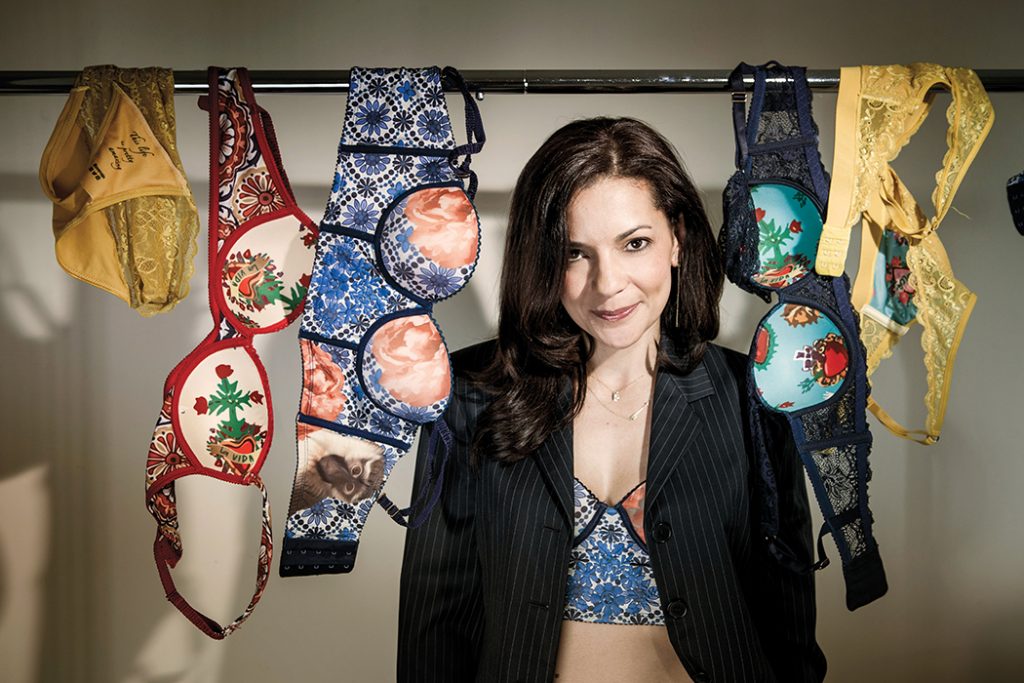“I grew up in a family where you could be a lawyer or a doctor—those were the two choices,” said Colombian-born Catalina Girald ’00, speaking by phone from San Francisco. As founder and CEO of Naja, a company that employs impoverished women in Colombia to manufacture affordable luxury lingerie at fair wages, Girald has escaped that narrow path.
Since she launched Naja in May 2013, Girald’s eclectic original designs and socially conscious business strategy have caught the eye of major media outlets, including USA Today, Fast Company, Inc. Magazine, and The Huffington Post. “I never thought I’d start a lingerie company,” said Girald. She never intended to be a lawyer, either. (Only a fear of calculus on the MCAT stopped her from applying to medical school.) “I knew from the beginning that I never wanted to be a partner in a law firm,” she said. She freely acknowledges that without Professor Kent Greenfield’s support at BC Law, and his gift for opening up the broader possibilities of a legal education, “there’s no way I would have finished law school.”
Yet she did finish, and landed a job as an associate working in mergers and acquisitions at Skadden LLP in New York. In the early 2000s, Girald already sensed the potential for online fashion retailing, and took classes at New York’s Fashion Institute of Technology, studying design and business. She left Skadden for Stanford Business School, graduating with an MBA in 2006.
Later that year, with angel and venture capital financing raised from Silicon Valley investors, Girald founded Moxsie, Inc., a consumer internet company promoting independent and eco-friendly fashion designers. She learned the hard way that “once you raise money from a firm of venture capitalists, the company is no longer yours,” and Moxsie was ultimately acquired by online retailer Fab.com, following Girald’s differences of opinion with investors about the company’s direction.
Girald’s designs reflect her lifelong fascination with worldwide cultures, from Japanese tattoos Mexican folklore to Indonesian batik.
While pondering her next career move, Girald set off on an eighteen-month odyssey. She learned about soap making and Ikat weaving in Indonesia, dying techniques in Vietnam, and food gathering and preservation from Mongolian nomads. She was struck by the self-confidence of the women in the remote tribal societies she visited. “My impression was that they didn’t seek the approval of men as much as women do in the western world—they were very sure of their roles,” she said.
On her return, the idea for Naja evolved out of a mix of hard-headed market research into possible niches in the $14 billion lingerie industry, and an idealistic vision of creating fashion that would empower both its makers and consumers. Girald’s designs reflect her lifelong fascination with worldwide cultures, from Japanese tattoos to Mexican folklore to Indonesian batik, and every pair of panties has the message “be your own kind of beautiful” printed inside. “From day one I knew I wanted to do something that would benefit women,” said Girald. She initially partnered with the Golondrinas Foundation in her home town, Medellin, Colombia, in a program called Underwear for Hope, that trains and employs single mothers and women heads of households from the town’s poorest areas to make the lingerie wash-bags that come with all Naja bras.
With the recent opening of Naja’s own factory in Medellin, Underwear for Hope now also works directly with the women sewing Girald’s vibrant designs, women like Maria Jaramillo and her daughters and nieces whose employment brings some hope and resources to their gang-riddled neighborhood. “We’re constantly in touch with them,” said Girald, who visits Medellin around four times a year.
Girald’s success comes as no surprise to Professor Greenfield. “I admire what she’s done a great deal,” he said. “She’s a wonderful example of how a person can take a law degree in a completely new direction.”



